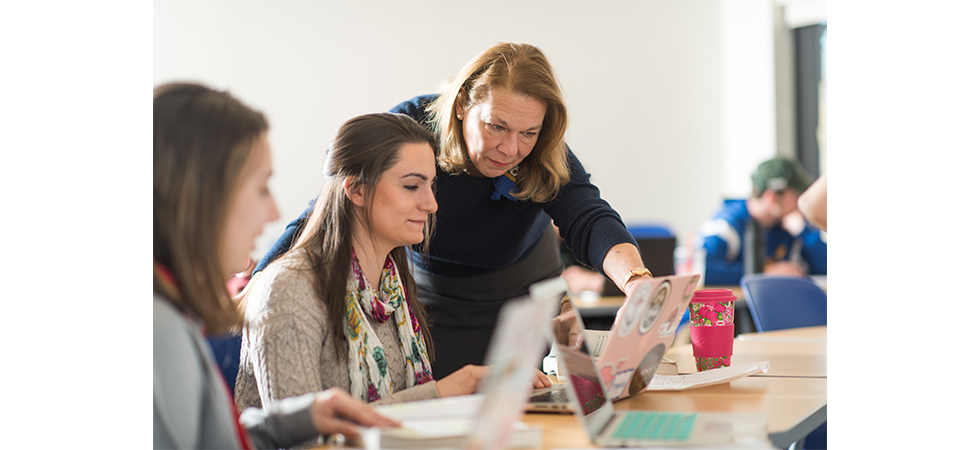Assumption Launches Experiential Learning Program to Provide Students with Practical, Relevant Business Opportunities

One of the cornerstones of an Assumption education is developing well-rounded students who have learning experiences beyond the walls of a classroom. Whether it’s using one’s skills and talents in volunteering in the community, engaging in internships, or through one of the many study abroad programs, Assumption students are provided many opportunities to apply their knowledge in a real-world setting. In fall 2016, the Business Studies department enhanced this commitment by creating an experiential learning program, which is dedicated to connecting students with local organizations to apply what they have learned in the classroom within a professional organization while still an undergraduate.
“We want the students to engage with the business community to put their learning into action,” said Experiential Learning Coordinator James Monette, MBA ’09, adding that this includes internships, projects, and community service-learning (CSL). “In our business classes, Assumption students learn concepts and theories that they can then apply by working with and supporting actual organizations in the local community. Such a model is congruent with the University’s mission that encourages students to use the gifts and talents they discover during their four years at Assumption to better the world in which they live.”
Housed within Assumption’s Business Studies department, the goal of the program is to provide career and learning opportunities for students and build upon Assumption’s relationships with organizations throughout the greater Worcester community. Monette explained that the business studies coursework and rich liberal arts foundation enables students to identify areas of need for local organizations and create strategies and solutions. In addition, the students can also support the organizations in the execution and implementation of these recommendations. Monette said that he envisions students helping organizations create a marketing plan, design social media initiatives, analyze operations to identify potential cost reductions or improve efficiency, help with bookkeeping and financial statements, or prepare tax returns.
“Students will not only provide business solutions for organizations, but the collaboration between the students and organizations will also enhance the students’ education,” he said. “They will actually experience what they learn about in the classroom, and the community organizations will serve as their laboratory.”
Alexis Maggi ’17, an organizational communications major from Agawam, MA, will soon begin an internship with Girls Inc., a nonprofit organization based in Worcester “which equips girls to navigate gender, economic and social barriers and grow into healthy, educated and independent adults.” As the marketing and communications intern, Maggi will draw upon theory, best practices and the latest marketing strategies, in particular social media, to raise the profile of the organization.
Maggi said that Monette not only helped her secure this internship, but helped her update her resume and prepare for the interview process prior to her meeting with Girls Inc. “Working with Mr. Monette was a very positive experience and I was happy I could take advantage of this opportunity that the school is [providing students],” Maggi added.
Since the program launched in August, it’s been well-received on campus–Monette has already worked with more than 100 students writing resumes, creating LinkedIn profiles, and prepping for interviews. In addition, he’s already helped 30 students find internship opportunities, including Amanda Higgins, who completed requirements for her psychology degree in December 2016. Higgins, who double minored in marketing and sociology, worked with Monette to rebuild her resume, as well as research internships and prepare for her phone and in-person interviews. With Monette’s help, Higgins landed a six-month paid internship at The Spiegel Center Advanced Facial Aesthetics in Chestnut Hill, and is currently interviewing for competitive marketing jobs in the Boston area.
Monette said that he has found that while many schools offer CSL and internship opportunities, Assumption focuses on experiential learning that includes partnering with local businesses on class projects that can be woven into/ incorporated into the curriculum. “Our program is innovative because we are putting everything under the umbrella of ‘experiential learning’ by offering real-world, hands-on experiences through the curriculum in addition to internships,” he said.
The goal of the experiential learning program is for business majors to have at least one hands-on experience each year. According to Monette, a program such as this one is important because it not only allows students to apply their classroom knowledge to real-world situations—and as a result helps students build portfolios that will give them a competitive advantage during their career search—but helps students to begin thinking about their careers early and to have a few experiences that will help them in choosing a major or a career to pursue.
“The business community has been very enthusiastic about the program,” he said. “The small business community really has a need for certain expertise and the students have a wealth of new ideas so it becomes a ‘win-win’ for everyone involved.”
